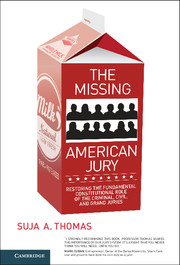 The Missing American Jury
The Missing American Jury Book contents
- Frontmatter
- Contents
- Acknowledgments
- 1 The Missing American Jury: An Introduction
- PART I The Jury Now
- PART II The Future Jury
- 4 Interpreting Jury Authority
- 5 Restoring the Jury
- 6 Beyond the Constitution: Affirming a Role for Lay Jurors in America's Government and World-Wide
- 7 A Branch Among Equals in American Democracy: A Conclusion
- Index
4 - Interpreting Jury Authority
from PART II - The Future Jury
Published online by Cambridge University Press: 05 June 2016
- Frontmatter
- Contents
- Acknowledgments
- 1 The Missing American Jury: An Introduction
- PART I The Jury Now
- PART II The Future Jury
- 4 Interpreting Jury Authority
- 5 Restoring the Jury
- 6 Beyond the Constitution: Affirming a Role for Lay Jurors in America's Government and World-Wide
- 7 A Branch Among Equals in American Democracy: A Conclusion
- Index
Summary
The American jury today resembles neither its English predecessor nor the jury envisioned by many of the Founders. Thus far, the book has assumed that the jury that existed in England in the late eighteenth century and the jury discussed by the Founders form the model for the jury under Article III, the Seventh Amendment, and the Fifth Amendment. This Chapter explores whether the Supreme Court and the other traditional actors – the executive, the legislature, the other courts, and the states – should interpret the jury provisions based on this jury of the past.
How Should the Traditional Actors Interpret the Jury Provisions?
The fall of the criminal, civil, and grand juries is linked to several related factors discussed in Chapter 3. First, the Supreme Court has failed to treat the jury in a similar manner to the traditional actors. Despite parallels in the constitutional text and the likeness of the Founders’ discussion of the traditional actors and the jury, the Court has not recognized doctrine analogous to separation of powers or federalism to protect the jury's authority. Second, it appears that no such doctrine has been established for the jury, at least in part because of the self-interest of the traditional actors, who benefit from shifts in authority from the jury to themselves. Third, the unique characteristics of the jury have contributed to its fall. The jury cannot decide cases without a traditional actor permitting the jury to do so. The jury also has no ability to affect the power of the traditional actors and thus, has no opportunity to influence those decision-makers to act more favorably toward it. Fourth, legal elites and companies appear to have influenced the decline.
The traditional actors’ future recognition of the jury as essentially a “branch” of the government under a protective doctrine analogous to separation of powers or federalism could help restore the jury's power. Of course, the Supreme Court must be willing to change its jurisprudence. And even if doctrine similar to the separation of powers or federalism were established for the jury, it could still remain at a disadvantage to the traditional actors due to the jury's lack of ability to act independently and its insufficient influence on the traditional actors.
- Type
- Chapter
- Information
- The Missing American JuryRestoring the Fundamental Constitutional Role of the Criminal, Civil, and Grand Juries, pp. 109 - 146Publisher: Cambridge University PressPrint publication year: 2016


